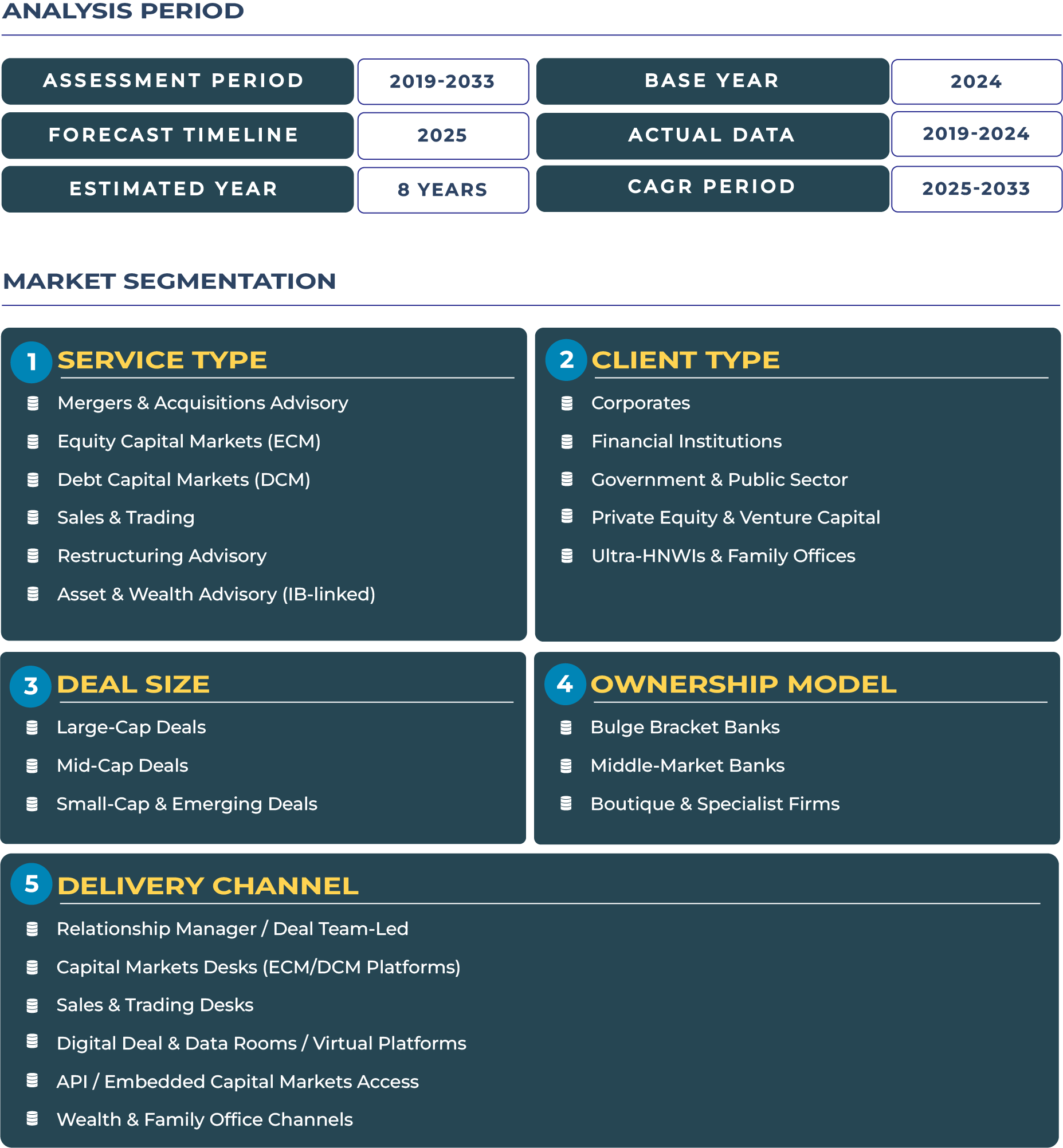UAE Investment Banking Market Outlook: The Rise of a Digitally Empowered Financial Advisory Ecosystem
The UAE Investment Banking Market is entering a new growth phase driven by digital transformation, global corporate advisory expansion, and fintech integration. As one of the most diversified financial centers in the Middle East, the UAE investment banking ecosystem thrives on its strategic position as a global trade and finance hub. With Ministry of Finance UAE spearheading fiscal modernization, the market is expected to grow from USD 1.0 billion in 2025 to USD 1.5 billion by 2033, reflecting a healthy CAGR of 5.3%. This steady trajectory is supported by robust ECM and DCM activities, dynamic fintech adoption, and strong deal-making momentum in Dubai and Abu Dhabi.
Note:* The market size refers to the total revenue generated by banks through various services.
The UAE’s banking sector, underpinned by digital-first policies, aims to expand its investment banking capabilities beyond regional boundaries. Strategic partnerships, sovereign wealth initiatives, and the growth of family offices are catalyzing demand for investment advisory services across sectors such as infrastructure, renewable energy, and technology. These drivers position the UAE as a regional powerhouse for cross-border merger and acquisition and ECM advisory, despite global economic uncertainties.
UAE’s Transformation into a Global Digital Investment Advisory Powerhouse
The UAE investment banking landscape reflects its transformation into a modern financial hub connecting Asia, Europe, and Africa. As the nation continues its economic diversification goals under UAE Vision 2021 and Vision 2031 frameworks, investment banks are aligning their strategies to support national priorities such as IPO growth, sustainable finance, and digital banking integration. The government’s regulatory support through Abu Dhabi Global Market (ADGM) and Dubai Financial Services Authority (DFSA) has accelerated the evolution of fintech-enabled investment services.
Despite the competitive regional environment, the UAE’s robust digital infrastructure, access to sovereign wealth capital, and openness to global investors create fertile ground for advisory-driven investment banking growth. By 2033, the market is expected to strengthen its dominance in ECM and cross-border merger and acquisition, underpinned by increased IPO activity and digital financing platforms facilitating institutional participation. DataCube Research anticipates stable growth driven by fintech innovation, government-led diversification, and foreign investor confidence, even amid ongoing global macroeconomic uncertainties.
Drivers & Restraints: Strategic Catalysts and Challenges in the UAE Investment Banking Sector
Global Financial Hub and Cross-Border merger and acquisition as Key Growth Drivers
The UAE’s position as a global financial hub continues to fuel deal-making activity across sectors. The strong presence of international corporations in Dubai and Abu Dhabi encourages high-value merger and acquisition and ECM transactions, while regulatory clarity offered by the Central Bank of the UAE enhances investor confidence. Strategic cross-border collaborations, especially with European and Asian capital markets, have expanded the reach of UAE-based investment banks. The introduction of digital bond issuance and cross-border fintech platforms further reinforces the UAE’s competitive edge in the investment banking ecosystem.
Competition from GCC Neighbors and Limited Domestic Issuance as Constraints
While the UAE leads in financial innovation, it faces intensifying competition from neighboring markets like Saudi Arabia and Qatar, which are expanding their capital markets and IPO ecosystems. Additionally, limited domestic corporate issuance compared to larger economies can restrain growth in debt and equity capital markets. Market players must therefore focus on cross-border advisory, fintech partnerships, and private capital placements to sustain their momentum. Moreover, global macroeconomic headwinds and geopolitical instability could influence deal volumes in the near term, requiring investment banks to enhance risk management frameworks.
Trends & Opportunities: Fintech Integration and Emerging ECM Advisory Pathways
Accelerating Fintech-Driven Investment Advisory Transformation
One of the most defining trends in the UAE Investment Banking Market is the deep integration of fintech into advisory and capital market operations. Investment banks are adopting AI-assisted analytics, blockchain-based transaction verification, and real-time market intelligence systems to streamline deal execution. The rise of digital-first wealth management and algorithmic trading platforms is also reshaping client expectations. Regional fintech accelerators supported by ADGM and DFSA are encouraging partnerships between banks and startups, creating a synergistic environment for next-generation investment banking models.
IPO and ECM Advisory Expansion Creating New Market Opportunities
With increasing emphasis on corporate listings and privatization, the UAE has seen a surge in IPO activity on the Dubai Financial Market and Abu Dhabi Securities Exchange. Investment banks are capitalizing on these opportunities by providing sophisticated ECM advisory services that integrate digital investor engagement and analytics tools. The focus on ESG-linked equity offerings and green bonds is further diversifying deal portfolios. This evolving ECM ecosystem positions the UAE as a preferred hub for both regional and international capital raising.
Competitive Landscape: Strategic Partnerships Define UAE Investment Banking Competitiveness
The UAE Investment Banking Market is dominated by major financial institutions such as Emirates NBD, First Abu Dhabi Bank (FAB), and international players like HSBC and Citigroup. Emirates NBD continues to innovate through digital investment advisory platforms, while FAB focuses on expanding regional ECM leadership. Key strategies include developing fintech-enabled advisory solutions and leveraging sovereign funds for private equity expansion. Recent initiatives include Emirates NBD’s 2024 partnership with digital wealth platforms and FAB’s collaboration with ADGM to enhance sustainable finance offerings. These developments signal an evolving competitive environment defined by technology-led differentiation and regional integration.







